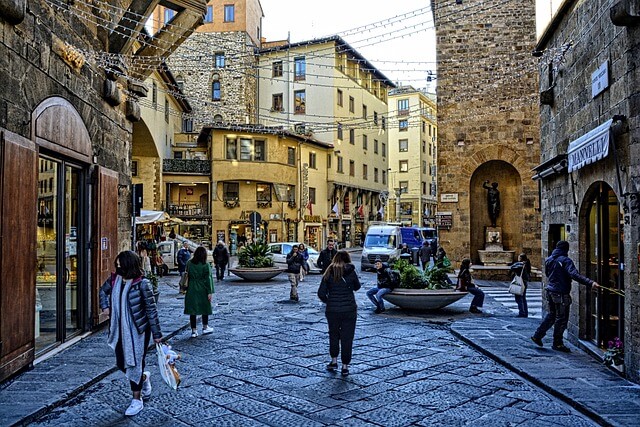Mastering the Art of Finding Great Internships in Italy
By Emma Bird

|
|
Piazza del Duomo in Milan.
|
Aupairing, washing dishes, and waiting on tables in restaurants — this is not exactly what I had in mind when I went off to Italy in search of the lifestyle depicted in Fellini’s classic movie La Dolce Vita.
And although it gave me a bit of handy cash at the time and allowed me to improve my very bad language skills, it certainly didn’t push me up the Italian career ladder.
Of course, what I should have done was land an internship. But at the time I didn’t have the knowledge (or the guts) even to know where to start. Gaining valuable work experience in England, where I grew up, was complicated and competitive enough — let alone trying to find it in Italy, where the rules are completely different.
The biggest hurdle you face is convincing employers that you are an ideal candidate for an internship. For whereas American, Australian and British students all graduate relatively young, it is not uncommon for Italians to still be studying for their first degree aged 30. Given that a stage (the Italian word for internship) is the exception rather than the norm among diligent students planning their futures, this also means that you will find yourself explaining to a potential employer why you are a candidate.
So just how do you go about finding a job that will advance you in the career of your dreams?
Language Ability
First of all, be realistic about your language ability. Ideally, you should have a good command of the language — listening, reading, writing, and speaking — and be willing to improve upon these skills once in your placement. It goes without saying that the better you speak Italian, the easier it will be to communicate with your new colleagues.
"Preparing in advance or taking language classes in Italy before starting an internship is therefore essential," says Emily Merson, founder and director of business development for Global Experiences, which places young people in internships in Italy and elsewhere. “For some placements that do not require language experience, interns may find that their tasks are more junior to their work experience level to compensate for the language barrier. In other cases interns are able to work in English as the company may have close ties to the international marketplace, but they may not have many opportunities to learn or practice their Italian.”

|
|
A street in Florence.
|
Know What You Want to Do
Think about what you want to do for a career and find an internship that will help you advance in that field. There is little point opting for something that you have no interest in, as this will only leave you with a jumbled resume that you will then have to explain to employers back home. For example, if you want to work in journalism contact the regional papers or online media and put yourself forward as a candidate. You may not be asked to write front-page exclusives but there’s a good chance you will be asked to sift through documents or find a telephone number. If you want to work in fashion, then consider the exact area you want to work in. Merchandising? Design? Retailing? Do your research carefully and send your resume (curriculum in Italian) and cover letter to the human resources department, identifying the area in which you want to work. If you are available at any time, say so. But remember that Italy is shut down in August, so if possible avoid working in the summer.

|
|
Santa Maria di Trastevere, in Rome.
|
Think About Location
Admittedly the big cities have the most opportunities but this is normally the case only if you know people. If you are from an EU country or are lucky enough not to need a visa, one option is arriving and then finding your internship. My ex-flatmate in Milan had a degree in interior design: After sending his resume to 15 different companies, one of them took him on. He ended up working with their top designer.
Don’t rule out small cities. If you won’t know anyone in Milan except for your new work colleagues, you may find yourself extremely lonely after work. The Milanese are workaholics and do not have much time to befriend lost foreigners. In smaller cities, especially in the south, you will find yourself adopted by your colleagues who will go out of their way to make sure you are okay. In the long-term you may not appreciate this clinginess, but on a short-term assignment don’t underestimate it.
Draw up a Shortlist
Just as companies draw up a shortlist of prospective employees you should do the same with the companies you are hoping to work for. Identify five companies and tailor-make your applications to fit each one. Just as you would do with a company back home, explain why you want to work for them and what you can offer as an intern. Stress that you are looking for an internship of limited duration and that you will not be expected to be taken on afterwards. If you have language skills, this is the time to stress them as very few Italians have a good working knowledge of other languages.
Before committing yourself to a work placement you should be clear what the employer can offer you and what you want to get out of the internship. Ask yourself:
-
How can I use my academic skills/knowledge?
-
What general skills will be useful?
-
What personal skills will be useful?
-
How will this help me advance my career?
Using an Agency
If you don’t want to plan your own internship there are companies that do this for you. The downside is that you have less choice over the company you end up working for. Websites that offer databases of internships in Italy include Transitions Abroad's own internship section. However, arranged internships can be costly — so do your research and comparisons.
Merson, who grew up in Little Italy in Sidney, Australia, says successful internships in Italy give young people a passport into the country. “The business culture in Italy is very challenging for those who come from outside and it can be hard to find opportunities without assistance or personal connections.” Having someone organize it on your behalf, can eliminate these problems.
Remember that whatever avenue you decide to take, an international internship demonstrates initiative and maturity, along with the ability to adapt to foreign and challenging environments — which in itself should make your resume stand out from the rest.
Choosing an Internship Placement Agency
for an Italian Placement
If you decide to opt for a placement agency to arrange for your internship, make sure you find a reputable one. Sadly, there do exist companies out here that are only interested in making a quick buck. To make sure you get value for money, follow these tips.
-
Any good company will be willing to let you talk to former participants to obtain their honest feedback. Think twice about the company if it is reluctant to do this.
-
Ask what services the company will provide, both before you go and once you arrive.
-
Are your accommodations provided?
-
What happens (and let’s hope it doesn’t) if you have problems either with your housing or your placement? Will you have someone to contact when you are in Italy?
-
Ask for a letter of confirmation from the company you will be interning for. This lets you know they are definitely expecting you.
-
Arranged internships can range from moderate to very costly, so do your research and compare as much as possible before deciding.
-
Remote internships are sometimes offered as well, but when it comes to Italy, you really want to be here to enjoy a bit of la dolce vita as well!
Sample experienced organizations with placements in Italy:
Global
Experiences offers internships in Florence, Milan,
and Rome along with many other locations worldwide.
IESAbroad offers credit-earning semester and summer internships in Rome and Milan.
CEA CAPA offers internships-only or internships plus study in Florence and Rome.
World Internships offers a very wide range of internships in Italy, and you should check them out due to their variety and uniqueness.
|
Emma Bird continues to work as a freelance journalist in the U.K. after many years working in Italy.
|
